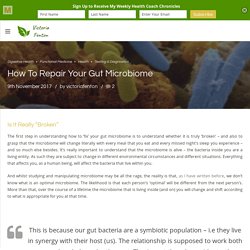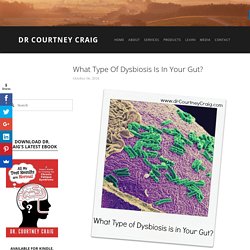

There is some treatment information filed with specific health conditions. Wanna fix gut, adrenal, and sleep problems? You gotta start here... Living in modern society has it’s benefits.

While our ancestors and fellow modern humans living in 3rd world conditions have to deal with a range of deadly pathogens, our modern healthcare system is well-equipped to deal with things of that nature. While both tend to die of these infections, we stick around because we have methods of successfully treating them. While our healthcare system is fantastic at dealing with issues like this, that doesn’t mean we don’t have 1st world problems. More than 50% of the population has at least 1 chronic disease, and treating these diseases represents more than 80% of our healthcare costs.
To say we are ill-equipped at dealing with chronic disease is an understatement. It’s universally agreed upon that most of the things that drive our chronic disease burden are driven by lifestyle. But what about chronic issues that fall outside the scope of those diseases? As such, people with these issues are often dismissed entirely. Image source Image source.
Treating Candida. Treating Leaky Gut. Treating Constipation. Treating Bowel Disease Series | Paul Jaminet. Treating H. Pylori. Treating IBS. Treating Parasites. What To Do If You Need To Take Antibiotics. Special Diets for Gut Repair. Secretory IgA (SigA) Fecal Microbiota Transfers (FMT) Helminth/Hookworm Therapy. Phage Therapy. Supplements. How To Repair Your Gut Microbiome – Victoria Fenton. Is It Really “Broken” The first step in understanding how to ‘fix’ your gut microbiome is to understand whether it is truly ‘broken’ – and also to grasp that the microbiome will change literally with every meal that you eat and every missed night’s sleep you experience – and so much else besides.

It’s really important to understand that the microbiome is alive – the bacteria inside you are a living entity. As such they are subject to change in different environmental circumstances and different situations. Everything that affects you, as a human being, will affect the bacteria that live within you. And whilst studying and manipulating microbiome may be all the rage, the reality is that, as I have written before, we don’t know what is an optimal microbiome. BEYOND DIET: What Else Is Important For Healing Gut Issues? – Victoria Fenton Healthcare. The saying goes that “Food Is Medicine”… This is because the nutrients we eat inform our biochemistry – they are the building blocks of what makes our cells and fuels our wellbeing.

Changing what you eat can change your state of health. The computer programming analogy of “Garbage In, Garbage Out” applies just as well to human health as it does to software: our health is founded upon the quality and variety of the food that we consume. In this context, however, it can be very tempting to imagine that dietary change is all that’s necessary to completely revolutionise your health. This is particularly true in the case of digestive health. And in some ways, this can be true – if you begin from a place of eating only garbage, replacing that with only nutrient-dense foods will undoubtedly transform your digestion. But in my clinic I get people through the door who have tried every diet possible and whose response to not feeling better has been to try to diet harder, restrict further. How to improve gut health? Build resilience - Hack your gut.
People with gut problems often spend an eternity looking for how to improve their gut health.

Many look to simple solutions such as supplements and cutting things out of their diet. These approaches rarely work in the long term because they’re missing a large part of the equation. They don’t look at the body as a system. We are all a collection of cells, organs, and tissues working together in synchrony for one common goal: survival. How To Restore Digestive Health. How To Restore Gut Flora After Antibiotics.
Gut Microbiome: 16 Factors that can Improve or Worsen It - Selfhacked. How to Restore Healthy Gut Flora Over the Long-Term (Especially If You Can't Tolerate Probiotics and Fermented Foods) Everything you need to know about digestive enzymes. About GI Motility. Colostrum, Digestive Immunity, and Digestive Repair. What Type of Dysbiosis is in Your Gut? — Dr Courtney Craig. Dysbiosis is the term used to describe an unbalanced relationship between the host (us) and microorganisms.

Dysbiosis is common in the gastrointestinal tract but also may present itself on the skin, urogenital tract, sinuses, and oral cavity. Did you think there was one kind of dysbiosis? There is more to dysbiosis than a simple imbalance of species. Here I present 4 subtypes of dysbiosis that have direct, indirect, and complex effects on the host--you! Insufficiency Dysbiosis Insufficient populations of “good bacteria” such as bifidobacteria and lactobacillus leaves the gastrointestinal tract vulnerable to colonization with pathogens. What to do? Repopulate the gut with “good” species by choosing a quality probiotic and/or prebiotic supplement. Bacterial Overgrowth Excessive quantities of bacteria or yeast species in the gut can overcrowd beneficial species. Natural antimicrobials are effective at eliminating bacterial overgrowth in the small bowel. Big Bellies: the Causes of and Treatments for Bloating.
No Gallbladder? - Primal Body Primal Mind. Lipopolysaccharides (LPS): 16 Ways to Reduce Them - Selfhacked. 8 Ways to Heal Low Stomach Acid Naturally. Revolutionary Treatment for Maintaining Your HCl. Should You Supplement with L-Glutamine? 8 Ways to Improve Fat Malabsorption Naturally. Five Common Mistakes Made When Trying to Improve One's Digestive Health. Gut problems not getting better? Consider gut autoimmunity.
Practical Steps for Healing the Gut—with Michael Ruscio.